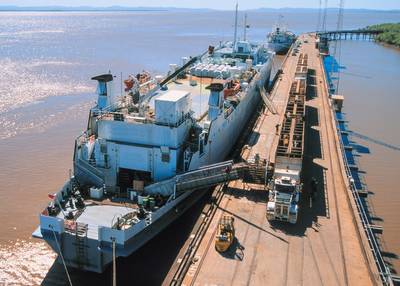Australia Working to Reassure Indonesia Over Cattle Deaths
Australia’s Department of Agriculture (DAFF) has stated that testing has returned negative results for Lumpy Skin Disease and Foot and Mouth Disease, after over 150 cattle died on a voyage to Indonesia on Vroon’s Brahman Express.
Australia has received confirmation from the Indonesian authorities that the export of live cattle from a particular registered establishment in the Northern Territory has been suspended pending further investigations to determine the cause of the deaths.
The department continues to investigate, and has stated that clinical signs present in the cattle are consistent with botulism. Botulism in cattle is most often caused by the cattle eating a toxin produced by bacteria in contaminated feed.
Detecting botulism through tests is often difficult, owing to the low amounts of toxin present in the bloodstream of affected cattle. As a result, testing for botulism is a process of elimination and will take some time, says DAFF.
Animals Australia says botulism is a largely preventable bacterial infection, and if this was the cause of death, the suffering of those animals may have been considerable, and prolonged. “Botulism causes progressive paralysis, with affected animals experiencing hind leg weakness, leaving them unable to stand, and paralysis of the muscles of the face, jaw and tongue, which results in the loss of ability to eat or swallow. Ultimately, animals will suffocate to death when their respiratory system becomes paralysed and they can no longer breathe.”
No information about whether euthanasia was provided has been made public.
Currently, veterinarians are not required on voyages between Australia and Indonesia, but the Australian Veterinary Association (AVA) believes that when live export of animals by sea occurs, an Australian Accredited Veterinarian must accompany each shipment.
The AVA believes that the Australian Standards for the Export of Livestock (ASEL) regulatory controls are deficient, as they allow exporters to apply for an exemption from having an Australian Accredited Veterinarian on board short haul voyages, such as the one involving the Brahman Express. “This is not acceptable. Veterinarians must be onboard all live export voyages, irrespective of length, to protect the health and welfare of animals on the ship,” said AVA President Dr Diana Barker.
There is concern that diplomatic harm may have been caused, because Indonesia was not made aware of the deaths until the remaining 2,300 animals were offloaded and the vessel had departed. Local media reports allege that Indonesian officials were told that only eight cattle had died.
One cattle producer stated on NT Country Hour: "It is very difficult to believe that 100 head of cattle die in a few days of botulism without having significant symptoms prior to the voyage."
“A delicate diplomatic dance will be expected to play out now,” says former live export veterinarian and industry commentator, Dr Lynn Simpson, who notes that dead cattle are typically cast overboard at sea after being dismembered (so they don't float).
Australian law requires that the government is informed within 12 hours if far fewer cattle die onboard. Any punishment for failing to do so would likely be in commercial disadvantage for following voyages, says Simpson. “Of course, all these risks could be avoided with chilled meat in boxes instead of live exports.”















